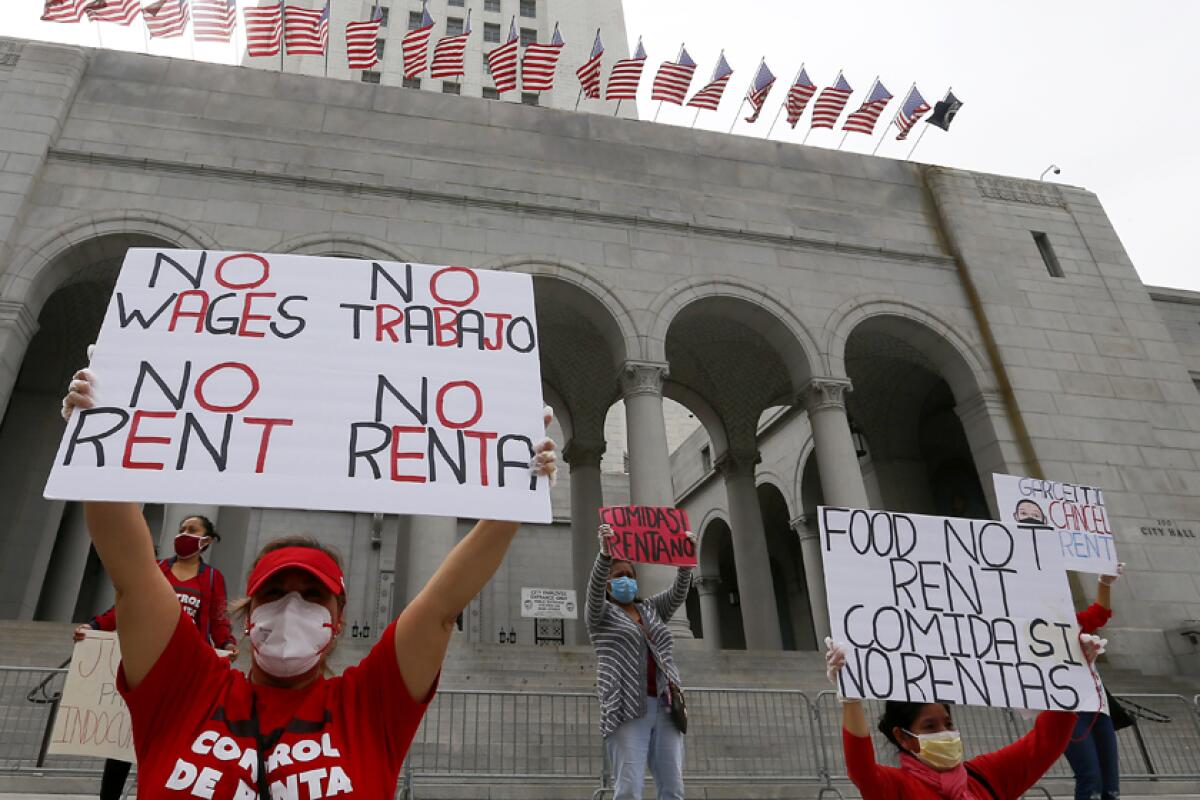Let courts help tenants through the eviction process

- Share via
Even with the state moratorium on evictions being lifted Oct. 1, there are protections in place for tenants who lost income during the pandemic and fell behind on rent. There is also a $5.2-billion state rental assistance fund that is still available to tenants and landlords.
In the city of Los Angeles, there is still a moratorium on evictions for nonpayment of rent due to pandemic-related financial problems that lasts until a year after the current state of emergency expires. But when some tenants, particularly those who don’t speak English well or are in the country illegally, receive an eviction notice, they may be so intimidated that they just move out — “self-evict” — before they ever get a chance to argue their case.
Fearing the the expiration of the statewide moratorium will result in an increase in eviction proceedings, followed by a flood of tenants leaving their homes, L.A. Mayor Eric Garcetti and Hilda Solis, chairwoman of the L.A. County Board of Supervisors, sent letters last week to Eric C. Taylor, the presiding judge of the Los Angeles County Superior Court, and to the Judicial Council of California, imploring them to not let eviction filings move forward unless the court can verify that a landlord was denied rental assistance. Landlords are required to apply for rental assistance before trying to evict a tenant for nonpayment.
But court officials say it’s not that simple — that court clerks processing eviction requests are not equipped to determine whether landlords filed legally sufficient paperwork. All they can determine is that the landlords did file some kind of paperwork and checked the right boxes on the forms. Once that’s done, a clerk can issue a summons.
Taylor pointed to other things the court is doing to help tenants, such as starting an online dispute resolution program for evictions. Also the official court notice of an eviction filing sent to tenants states at the top in capital letters that they should apply for rental assistance and offers a phone number and website for a rental assistance program, as well as phone numbers for seven legal aid organizations.
That’s all good. But tenants who can show they have fallen behind on rent due to the pandemic should not be dragged into court at all.
That’s what state legislators intended when they passed laws last year to protect tenants who can’t pay rent as a result of the pandemic — and city officials or legal advocates don’t want evictions to start happening to L.A. renters now.
There should be a way for someone in the court system to make sure landlords have done the bare minimum they are required to do before court proceedings start. Yes, once the proceedings are underway a judge can rule that the landlord’s proof is incomplete or that the landlord hasn’t done everything required to apply for rental assistance before starting eviction proceedings — and then order the landlord to do that before trying to evict a tenant.
But it shouldn’t have to get that far. Not every tenant is in the right. But historically, landlords have the upper hand in court in eviction cases. They usually have lawyers while poor tenants rarely do. It’s promising that legal service organizations are preparing to deal with eviction cases, but they could easily be overwhelmed.
If it takes the state Judicial Council instructing courts to be more aggressive about screening landlord applications before letting eviction proceedings go ahead, then that’s what it should do. The state already has a housing crisis. Let’s not unintentionally push more people into it.
More to Read
A cure for the common opinion
Get thought-provoking perspectives with our weekly newsletter.
You may occasionally receive promotional content from the Los Angeles Times.









